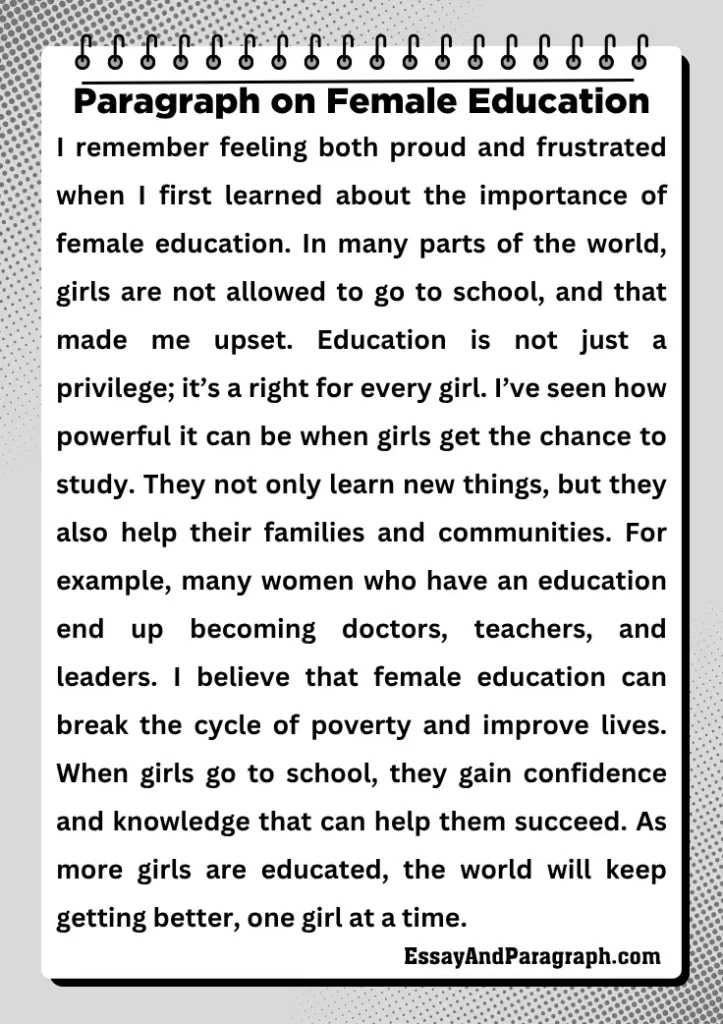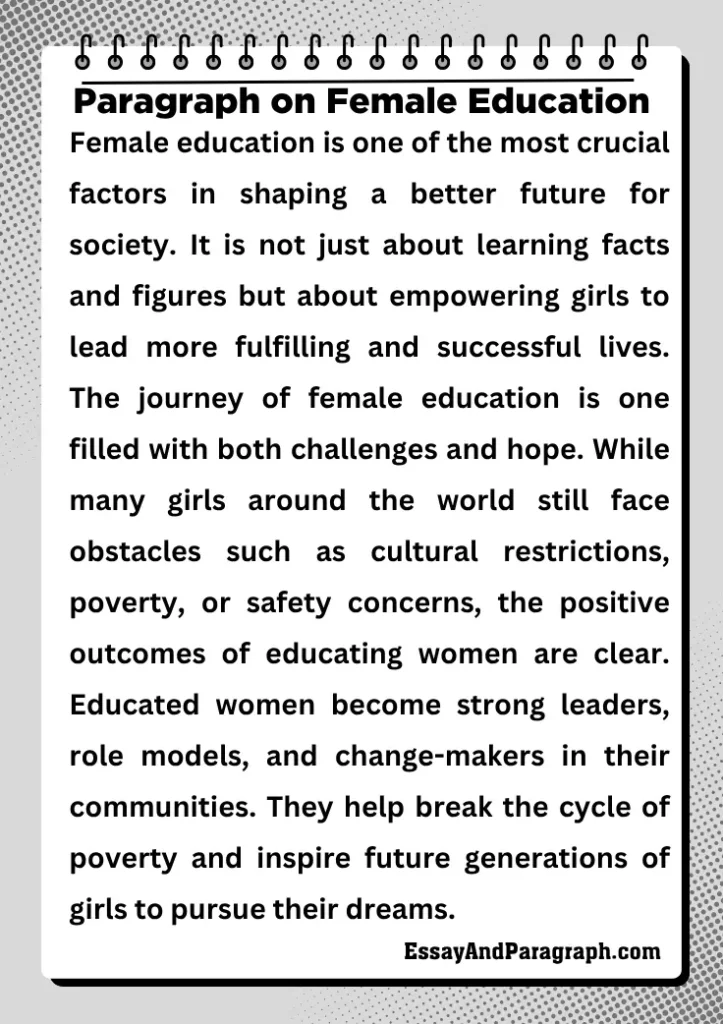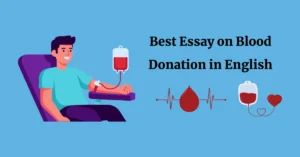In this article, we will learn how to write paragraphs on female education in different lengths (100, 150, 200, 250, 300 words). Female education has always been a topic close to my heart, and when I first learned about it, I couldn’t help but feel a deep sense of hope. I remember how my own education shaped who I am today. Education has the power to change lives, especially for girls. But, it hasn’t always been an easy journey. In this article, we’ll explore how to discuss the importance of female education in a way that resonates with both kids and adults.
Paragraph on Female Education – 100 words
When I first thought about female education, I felt a mix of excitement and sadness. Education is so important, and every girl should have the right to go to school. In many countries, girls still don’t get the chance to learn. But when girls do get to go to school, they can change the world. I’ve seen how educated women grow up to help their families and communities. The future is brighter for every girl who gets an education. I believe that if more girls had the chance to study, the world would be a better place.
Paragraph on Female Education – 150 words
I remember feeling both proud and frustrated when I first learned about the importance of female education. In many parts of the world, girls are not allowed to go to school, and that made me upset. Education is not just a privilege; it’s a right for every girl. I’ve seen how powerful it can be when girls get the chance to study. They not only learn new things, but they also help their families and communities. For example, many women who have an education end up becoming doctors, teachers, and leaders. I believe that female education can break the cycle of poverty and improve lives. When girls go to school, they gain confidence and knowledge that can help them succeed. As more girls are educated, the world will keep getting better, one girl at a time.
 Paragraph on Female Education
Paragraph on Female Education
Paragraph on Female Education – 200 words
Thinking about female education, I feel a mix of hope and disappointment. Education can make a huge difference, but not every girl has the same opportunity to learn. Growing up, I had the chance to go to school every day, but many girls around the world still don’t. It was hard for me to understand why girls would be denied something so important. But when I look at women who had the chance to go to school, I see amazing change. Women who have an education often do things that help their families, like opening businesses or becoming doctors or teachers. They make a big difference in their communities.
What really excites me is knowing that when one girl gets an education, it can inspire others to do the same. Education creates a ripple effect, and soon, entire communities are stronger. However, there’s still a lot to be done. I believe that if we all continue working together, more and more girls will have access to the education they deserve. This will shape a brighter, more equal future for everyone.
Paragraph on Female Education – 250 words
The more I think about female education, the more I realize how powerful it is. I remember feeling both hopeful and frustrated when I first started learning about how many girls around the world don’t get the chance to go to school. Education is not just about learning subjects; it’s about building confidence, independence, and a better future. It’s hard to imagine a world where girls can’t learn, especially when education can change so much for them and their families.
When girls are educated, they break the cycle of poverty. For example, women with education are more likely to start their own businesses, raise healthier families, and become leaders in their communities. I have seen firsthand how women who are educated lead more fulfilling lives and have a broader impact on the world. One thing that gives me hope is that when one girl gets an education, she can inspire others to do the same.
But the road to education for girls isn’t always easy. In many parts of the world, there are barriers that stop girls from going to school, like poverty, cultural norms, or safety concerns. This needs to change. We must keep pushing to ensure that female education is a reality for all girls. The world needs more educated women to help solve problems and create a brighter future for all of us.
Paragraph on Female Education – 300 words
When I think about female education, it feels like such an important topic to me. Education is something that can transform a life, and every girl deserves the opportunity to learn. But when I first became aware of how many girls around the world don’t have the chance to attend school, I felt a mix of disbelief and sadness. The idea that girls might not be able to go to school simply because of their gender is heartbreaking.
I’ve always believed that education is a right, not a privilege. And when I look at the impact that education has had on women who have had the chance to go to school, I’m filled with hope. Educated women change the world. They are the ones who become doctors, teachers, and scientists. They start businesses, build communities, and support their families. I’ve seen how a woman’s education can uplift an entire generation. It doesn’t just change her life; it changes the lives of her children and everyone around her.
One of the most exciting things about female education is the ripple effect it creates. When one girl learns, she can inspire others to follow her path. This is why it’s so important to make education accessible to all girls, no matter where they live or what their circumstances are. There is still much work to be done, especially in rural and underdeveloped areas where girls often face challenges to attend school. But I am hopeful that with continued effort and awareness, we will see more girls getting the education they deserve.
FAQs on Female Education
1. Why is female education important?
Female education is important because it empowers women to make decisions that positively impact their lives and communities. Educated women are more likely to contribute to economic growth, improve healthcare, and uplift their families from poverty.
2. How can we improve access to education for girls?
Improving access to education for girls requires addressing barriers like poverty, cultural norms, and safety concerns. Providing scholarships, building safe schools, and encouraging community support are some ways to ensure girls get the education they deserve.
3. What are the benefits of female education?
Female education brings several benefits, including greater economic independence, improved health outcomes, and stronger leadership in communities. Educated women are also more likely to pass on the value of education to their children, helping future generations.
4. Are there any countries where female education is still a challenge?
Yes, in many parts of the world, particularly in rural and conflict-affected areas, girls still face significant barriers to education. These barriers include poverty, early marriage, and cultural norms that prioritize boys’ education over girls’.
5. How does female education contribute to societal change?
Female education contributes to societal change by fostering a generation of women who can lead, innovate, and drive economic and social progress. Educated women help reduce poverty, improve health, and promote gender equality in communities.
6. What can we do to support female education?
Supporting female education involves advocating for equal access to schooling, raising awareness about the importance of education for girls, and supporting organizations that provide educational opportunities for girls in underserved areas.
 Paragraph on Female Education
Paragraph on Female Education
Summary on Female Education
Female education is one of the most crucial factors in shaping a better future for society. It is not just about learning facts and figures but about empowering girls to lead more fulfilling and successful lives. The journey of female education is one filled with both challenges and hope. While many girls around the world still face obstacles such as cultural restrictions, poverty, or safety concerns, the positive outcomes of educating women are clear. Educated women become strong leaders, role models, and change-makers in their communities. They help break the cycle of poverty and inspire future generations of girls to pursue their dreams.










